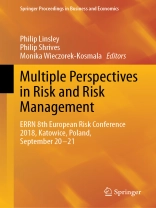This proceedings book presents a multidisciplinary perspective on risk and risk management. Featuring selected papers presented at the European Risk Research Network (ERRN) 8th European Risk Conference “Multiple Perspectives in Risk and Risk Management” held in Katowice, Poland, it explores topics such as risk management systems, risk behaviors, risk culture, big data and risk reporting and regulation. The contributors adopt a wide variety of theoretical approaches and either qualitative or quantitative methodologies.
Contemporary companies operate in a highly dynamic environment, accompanied by the constant development of the information technology, making decision-making processes highly complex and increasing the risk related to company performance. The European Risk Research Network (ERRN) was established in 2006 with the aim of stimulating cross-disciplinary research in the area of risk management. The network includes academics and industry experts from the fields of accounting, auditing, financial economics and mathematical finance. To keep the network lively and fruitful, regular “European Risk Conferences” are organized to present papers from a broad spectrum of risk and risk management areas.
Featuring contributions for Italy, South Africa, Germany and Poland, this proceedings book is a valuable reference resource for students, academics, and practitioners in risk and risk managementInnehållsförteckning
Directors Duties and Risk Governance.- Enterprise Risk Management Measurement: Insights from an Interdisciplinary Literature Review.- Accounting, Soci(et)al Risks, and Public Reason.- (In)Consistency between Private and Public Disclosure on Enterprise Risk Management and its Determinants.- Forward-looking Information Disclosure as a Risk Factor in Accounting – the Case of Poland.- Financial Slack and Company’s Risk Retention Capacity.- Agent-based Model of Risk Assessment: A Distributed Cognition Approach.- Small & Medium-sized Enterprise Risk Monitoring Based on Financial Analysis Results.- Risk management In German Leasing SMEs – A Qualitative Study.- What Is the Worst Scenario? Modeling Extreme Cyber Losses.- Risk Management in Automation of the Accounting Process.
Om författaren
Philip Linsley is Professor of Accounting and Risk at the York Management School, University of York, UK. His research interests are risk-related and include investigating risk disclosure, and risk and culture. He is particularly interested in applying the ideas of Mary Douglas to accounting. Philip is also a qualified chartered accountant and has significant experience as an academic lecturer and researcher.
Philip Shrives is a Professor of Accounting and Corporate Governance at Northumbria University. He is a Chartered Accountant, a Fellow of the UK Higher Education Academy and has a Ph D from University College Dublin. He lectures in risk reporting, corporate governance, impression management and research methods. He has published a range of papers in journals such as The British Accounting Review, Accounting, Auditing & Accountability Journal, Critical Perspectives on Accounting, The International Journal of Accountingand the Journal of Accounting Literature. He was previously Director of Academic Staff Development.
Monika Wieczorek-Kosmala is an academic lecturer and researcher at the University of Economics in Katowice, Poland. Her research interests include corporate finance, insurance and enterprise risk management. She is particularly focused on the value-creation benefits of ERM implementation, as well as the relationship between ERM and company’s capital structure optimization. She gained practical experience on insurance market as an insurance broker.












